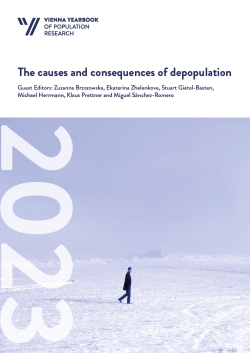|
 |
Introduction
Population decline: Towards a rational, scientific research agenda
Zuzanna Brzozowska, Ekaterina Zhelenkova and Stuart Gietel-Basten
Debate
Like high cholesterol, population decline is a problem, but not in the way you might think...
Wendy Sigle
The human eco-predicament: Overshoot and the population conundrum
William E. Rees
Population decline will likely become a global trend and benefit long-term human wellbeing
Wolfgang Lutz
Depopulation or population decline? Demographic nightmares and imaginaries
Stuart Gietel-Basten
A governance perspective on East Central Europe’s population predicament: Young exit, grey voice and lopsided loyalty
Pieter Vanhuysse
Low, but not too low, fertility can represent a positive development
Vegard Skirbekk
The key role of early education in an ageing and shrinking population: The example of Germany
Elke Loichinger - C. Katharina Spiess
Perspectives
Implementing youth-oriented policies: A remedy for depopulation in rural regions?
Martina Schorn
Review Articles
Revisiting the impact of urban shrinkage on residential segregation in European cities
David Huntington
Research Articles
Immigration and the prospects for long-run population decreases in European countries
Nick Parr
How much would reduced emigration mitigate ageing in Norway?
Marianne Tønnessen - Astri Syse
The triple burden of depopulation in Ukraine: examining perceptions of population decline
Brienna Perelli-Harris - Yuliya Hilevych
Is Spanish depopulation irreversible? Recent demographic and spatial changes in small municipalities
Fernando Gil-Alonso - Jordi Bayona-i-Carrasco - Isabel Pujadas-Rúbies
Neighbourhood effects and determinants of population changes in Italy: A spatial perspective
Federico Benassi - Annalisa Busetta - Gerardo Gallo - Manuela Stranges
Demographic sustainability in Italian territories: The link between depopulation and population ageing
Cecilia Reynaud - Sara Miccoli
Parsimonious stochastic forecasting of international and internal migration on the NUTS-3 level – an outlook of regional depopulation trends in Germany
Patrizio Vanella - Timon Hellwagner - Philipp Deschermeier
Data and Trends
Depopulation in Moldova: The main challenge in the context of extremly high emigration
Olga Gagauz - Tatiana Tabac - Irina Pahomii
|




 Home
Home
 Print
Print
 References
References
 Share
Share
 William E. Rees
William E. Rees